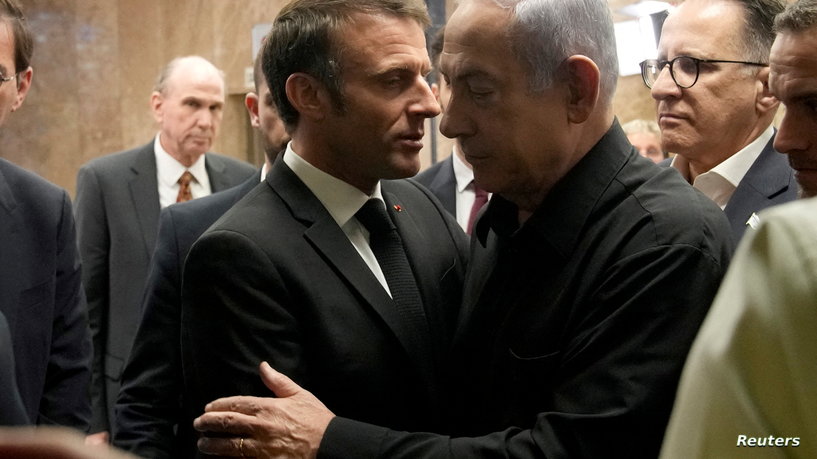Alwaght- Remarks by the French President Emmanuel Macron about the need to stop arms flow to Israel have infuriated the Israeli officials. Macron in a an interview with France Inter radio said that stopping arms exports to the Israeli regime for stopping the war in Lebanon is the first solution to end the conflict. He said that no positive and constructive measure has been taken in this regard do far.
"I have several times warned Israeli Prime Minister Benjamin Netanyahu that attacking the Gaza Strip and killing the people of this region is a big mistake," he added.
The remarks sent Netanyahu enraged, according to reports. Then in a phone conversation with Netanyahu, Macron warned that arms shipments and prolonged war in Gaza and its expansion in Lebanon cannot bring about the security Israel seeks.
At first glance, it seems that France is very worried about the spread of the war to Lebanon although Paris still considers itself a natural ally of Tel Aviv. However, the question is what are the reasons for the French to worry about the continuation of Israel's war in Gaza and its spillover to Lebanon?
Response to internal pressures
Perhaps one of the most important reasons that pushes Paris to seek arms ban on Tel Aviv after a year of devastating war in Gaza is the pressure of the public opinion inside France. Karim Emile Bitar, a professor of Middle East studies at Saint Joseph University in Beirut, believes that Macron is trying to take into account some internal aspects in France by announcing a request to stop arms exports to Israel. According to Bitar, trying to gain contentment inside France is one of Macron's goals from his recent comments about stopping arms exports to Israel. Recent developments have also shown that the pro-Palestinian groups in Paris and other French cities have been able to win the support of the public opinion of this country to stop the war. The arrangement of dozens of demonstrations and street protests in Paris against the Gaza war shows the spread of French public anger against the war in Gaza and now Lebanon.
On September 9 this year, about 2,000 people demonstrated in Paris in solidarity with the Palestinians. The demonstrators, most of whom were young people in Western style, chanted slogans such as "Israel leave, Palestine is not yours" and "Children of Gaza, children of Palestine, humanity is being slaughtered." At the same time, support for Palestine has also been extended to French politicians, and in June, Sebastien Delogu, a member of parliament from Le France Insoumise party waved the Palestinian flag in the parliament of this country when he questioned the government about the situation in Gaza. He then faced a two-week suspension from entering the parliament. A few days later, more than 50 MPs of the opposition in the parliament chose their clothes in the colors of the Palestinian flag during the parliamentary session. In addition, Rachel Keke Raissa, another member of the French parliament, brought the Palestinian flag into the session during the cabinet's questioning of the country's government, but the security forces intervened and took the flag from her.
Worry about the big war
Some international analysts believe that growing casualties, expansion of war to Lebanon, and growing risk of a big ground war involving the whole region have sent the French leader severely concerned about ongoing bombardment in Gaza and Lebanon's south. The war that started a year ago with the Israeli invasion of Gaza is no longer limited to the Gaza strip, and the flames have spread to the southern Lebanon since about two months ago. Although the Islamic Republic of Iran has said it is for a ceasefire, the actions of Netanyahu and continuing the bloodshed in Lebanon and Gaza by the Israeli army, as well as Netanyahu's arrogance game in the region, may make Iran's full involvement in a war against Israel inevitable. Tehran had repeatedly called for ceasefire in Gaza and Lebanon, but it seems that the Israelis insist on war as long as American and Western arms flow to them. Even with Iran's two missile attacks deep into Israel, Tel Aviv's insistence on continuing the war may face Tehran's subsequent reactions, and in this case, an all-out war in the region is not unthinkable. For Westerners and Americans, including the French government, who have been involved in the Ukrainian war front against Russia for two years now, the opening of a new war front in West Asia will only mean the loss of the West's focus on the Ukrainian front. In fact, if a full-scale war occurs in the region, the West will be forced to divert part of its financial and weapons resources from the Ukrainian front to the new war front in West Asia, and this is not something that France and its other Western partners want.
Paternalistic approach to Lebanon
It also should be taken into account that with regard to its colonial background in Lebanon, France has always had a paternalistic approach to the Arab country's developments and sees it a must in its foreign policy to seriously deal with Lebanon issues. So, it seems that Macron called for arms exports halt only when Gaza war spread to Lebanon. In current conditions, the French by calling for ceasefire especially in Lebanon try to satisfy the pro-French groups in Lebanon and paint themselves as influences in the Lebanese developments.



























